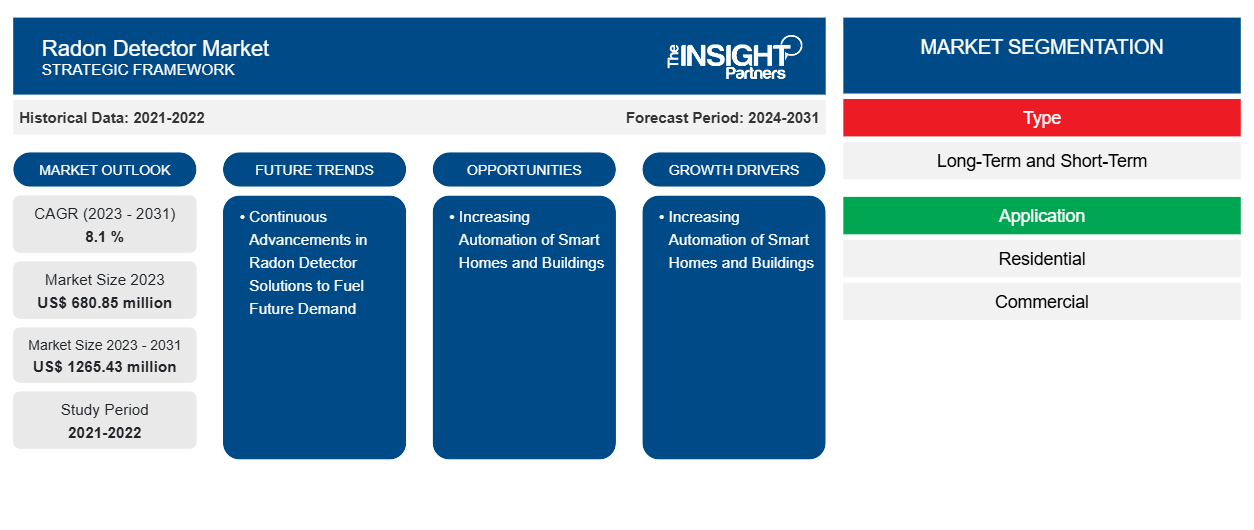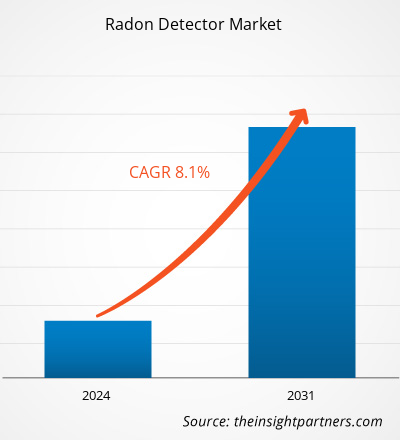Radon Detector Market Share and Forecast by 2031
Radon Detector Market Size and Forecast (2021 - 2031), Global and Regional Share, Trend, and Growth Opportunity Analysis Report Coverage: By Type (Long-Term and Short-Term), and Application (Residential, Commercial, and Others) and Geography
Historic Data: 2021-2022 | Base Year: 2023 | Forecast Period: 2024-2031- Report Date : Mar 2026
- Report Code : TIPRE00015023
- Category : Electronics and Semiconductor
- Status : Data Released
- Available Report Formats :


- No. of Pages : 150
The radon detector market size is projected to reach US$ 1265.43 million by 2031 from US$ 680.85 million in 2023. The market is expected to register a CAGR of 8.1 % in 2023–2031. The continuous advancements in radon detector solutions to fuel future demand are likely to remain key radon detector market trends.
Radon Detector Market Analysis
Since most people spend most of their time inside, whether at home or work, the significance of indoor air quality is expanding quickly to guarantee ideal living circumstances and prevent any illnesses linked to pollutants or hazardous gases present indoors. People who are exposed to a variety of indoor contaminants, including mold, radon, pressed wood products, and secondhand smoking, may develop severe health disorders like asthma and lung cancer. Thus, for both individual clients and business owners, indoor air quality has grown in importance. Hence, the demand for radon detectors is increasing and the market is growing globally.
Radon Detector Market Overview
Radon is a naturally occurring radioactive gas that can be hazardous to health when present in indoor spaces at high concentrations. Radon gas detectors are instruments used to identify and quantify the concentration of radon. Alpha-track detectors, charcoal canisters, continuous radon monitors, electret ion chamber detectors, and digital radon monitors are some of the techniques used by these detectors. They provide options for both long-term and short-term monitoring, and some even offer real-time measurements.
Customize This Report To Suit Your Requirement
Get FREE CUSTOMIZATIONRadon Detector Market: Strategic Insights

-
Get Top Key Market Trends of this report.This FREE sample will include data analysis, ranging from market trends to estimates and forecasts.
Radon Detector Market Drivers and Opportunities
Increasing
Indoor Air Quality Concerns
Radon monitoring and other indoor pollutants are being monitored more often as a result of growing public awareness of indoor air quality (IAQ) and its effects on health. Building managers, employers, and homeowners are more eager to keep the IAQ in good condition, which calls for radon sensors. Regulations and standards for radon mitigation and testing in homes and workplaces have been established in many different countries and regions. Radon gas sensors are required to be used in order to comply with these regulations, which increases demand for these devices.
Increasing Automation of Smart Homes and Buildings
Real-time notifications and remote monitoring are made possible by integration with smart home and building automation systems. The adoption of radon sensors is mostly driven by this convenience aspect, particularly in contemporary, networked buildings. Radon detectors are now more widely available and dependable because of advancements in sensor technology, which also include increased sensitivity, accuracy, and price. These developments entice people and companies to spend money on radon monitoring. The radon gas sensors market is expected to increase as a result of these factors. Thus, the increasing automation of smart homes and buildings is anticipated to present new opportunities for the radon detector market players during the forecast period.
Radon Detector Market Report Segmentation Analysis
Key segments that contributed to the derivation of the radon detector market analysis are type and application.
- Based on the type, the radon detector market is segmented into long-term and short-term. The long-term segment held a larger market share in 2023.
- By application, the market is segmented into residential, commercial, and others.
Radon Detector Market Share Analysis by Geography
The geographic scope of the radon detector market report is mainly divided into five regions: North America, Asia Pacific, Europe, Middle East & Africa, and South America/South & Central America. In terms of revenue, North America accounted for the largest radon detector market share. The regions have relatively high radon levels in some geographic locations, making them important shareholders. The public was generally aware of the dangers posed by radon, and both nations had well-established rules and regulations for radon testing and mitigation. Due to both legal restrictions and public awareness initiatives, there has been a significant focus on radon testing and mitigation in the areas with elevated radon levels.
Radon Detector Market Regional InsightsThe regional trends and factors influencing the Radon Detector Market throughout the forecast period have been thoroughly explained by the analysts at The Insight Partners. This section also discusses Radon Detector Market segments and geography across North America, Europe, Asia Pacific, Middle East and Africa, and South and Central America.
Radon Detector Market Report Scope
| Report Attribute | Details |
|---|---|
| Market size in 2023 | US$ 680.85 million |
| Market Size by 2031 | US$ 1265.43 million |
| Global CAGR (2023 - 2031) | 8.1 % |
| Historical Data | 2021-2022 |
| Forecast period | 2024-2031 |
| Segments Covered |
By Type
|
| Regions and Countries Covered |
North America
|
| Market leaders and key company profiles |
|
Radon Detector Market Players Density: Understanding Its Impact on Business Dynamics
The Radon Detector Market is growing rapidly, driven by increasing end-user demand due to factors such as evolving consumer preferences, technological advancements, and greater awareness of the product's benefits. As demand rises, businesses are expanding their offerings, innovating to meet consumer needs, and capitalizing on emerging trends, which further fuels market growth.

- Get the Radon Detector Market top key players overview
Radon Detector Market News and Recent Developments
The radon detector market is evaluated by gathering qualitative and quantitative data post primary and secondary research, which includes important corporate publications, association data, and databases. The following is a list of developments in the market for speech and language disorders and strategies:
- In December 2023, Radonova, Inc. introduced the SPIRIT continuous radon monitor for use by professionals in the United States and Canada. (Source: Radonova, Inc, Press Release)
- In April 2023, Ecosense announced the launch of its innovative radon monitoring devices in Canada. EcoBlu, EcoQube, and RadonEye devices are available for purchase through Canada, Amazon Canada, and the Ecosense website. (Source: Ecosense, Press Release)
Radon Detector Market Report Coverage and Deliverables
The “Radon Detector Market Size and Forecast (2021–2031)” report provides a detailed analysis of the market covering below areas:
- Market size and forecast at global, regional, and country levels for all the key market segments covered under the scope
- Market dynamics such as drivers, restraints, and key opportunities
- Key future trends
- Detailed PEST/Porter’s Five Forces and SWOT analysis
- Global and regional market analysis covering key market trends, major players, regulations, and recent market developments
- Industry landscape and competition analysis covering market concentration, heat map analysis, prominent players, and recent developments
- Detailed company profiles
Frequently Asked Questions
Naveen is an experienced market research and consulting professional with over 9 years of expertise across custom, syndicated, and consulting projects. Currently serving as Associate Vice President, he has successfully managed stakeholders across the project value chain and has authored over 100 research reports and 30+ consulting assignments. His work spans across industrial and government projects, contributing significantly to client success and data-driven decision-making.
Naveen holds an Engineering degree in Electronics & Communication from VTU, Karnataka, and an MBA in Marketing & Operations from Manipal University. He has been an active IEEE member for 9 years, participating in conferences, technical symposiums, and volunteering at both section and regional levels. Prior to his current role, he worked as an Associate Strategic Consultant at IndustryARC and as an Industrial Server Consultant at Hewlett Packard (HP Global).
- Historical Analysis (2 Years), Base Year, Forecast (7 Years) with CAGR
- PEST and SWOT Analysis
- Market Size Value / Volume - Global, Regional, Country
- Industry and Competitive Landscape
- Excel Dataset
Recent Reports
Testimonials
The Insight Partners' SCADA System Market report is comprehensive, with valuable insights on current trends and future forecasts. The team was highly professional, responsive, and supportive throughout. We are very satisfied and highly recommend their services.
RAN KEDEM Partner, Reali Technologies LTDsI requested a report on a very specific software market and the team produced the report in a few days. The information was very relevant and well presented. I then requested some changes and additions to the report. The team was again very responsive and I got the final report in less than a week.
JEAN-HERVE JENN Chairman, Future AnalyticaWe worked with The Insight Partners for an important market study and forecast. They gave us clear insights into opportunities and risks, which helped shape our plans. Their research was easy to use and based on solid data. It helped us make smart, confident decisions. We highly recommend them.
PIYUSH NAGPAL Sr. Vice President, High Beam GlobalThe Insight Partners delivered insightful, well-structured market research with strong domain expertise. Their team was professional and responsive throughout. The user-friendly website made accessing industry reports seamless. We highly recommend them for reliable, high-quality research services
YUKIHIKO ADACHI CEO, Deep Blue, LLC.This is the first time I have purchased a market report from The Insight Partners.While I was unsure at first, I visited their web site and felt more comfortable to take the risk and purchase a market report.I am completely satisfied with the quality of the report and customer service. I had several questions and comments with the initial report, but after a couple of dialogs over email with their analyst I believe I have a report that I can use as input to our strategic planning process.Thank you so much for taking the extra time and making this a positive experience.I will definitely recommend your service to others and you will be my first call when we need further market data.
JOHN SUZUKI President and Chief Executive Officer, Board Director, BK TechnologiesI wish to appreciate your support and the professionalism you displayed in the course of attending to my request for information regarding to infectious disease IVD market in Nigeria. I appreciate your patience, your guidance, and the fact that you were willing to offer a discount, which eventually made it possible for us to close a deal. I look forward to engaging The Insight Partners in the future, all thanks to the impression you have created in me as a result of this first encounter.
DR CHIJIOKE ONYIA MANAGING DIRECTOR, PineCrest Healthcare Ltd.Reason to Buy
- Informed Decision-Making
- Understanding Market Dynamics
- Competitive Analysis
- Identifying Emerging Markets
- Customer Insights
- Market Forecasts
- Risk Mitigation
- Boosting Operational Efficiency
- Strategic Planning
- Investment Justification
- Tracking Industry Innovations
- Aligning with Regulatory Trends




















 Get Free Sample For
Get Free Sample For